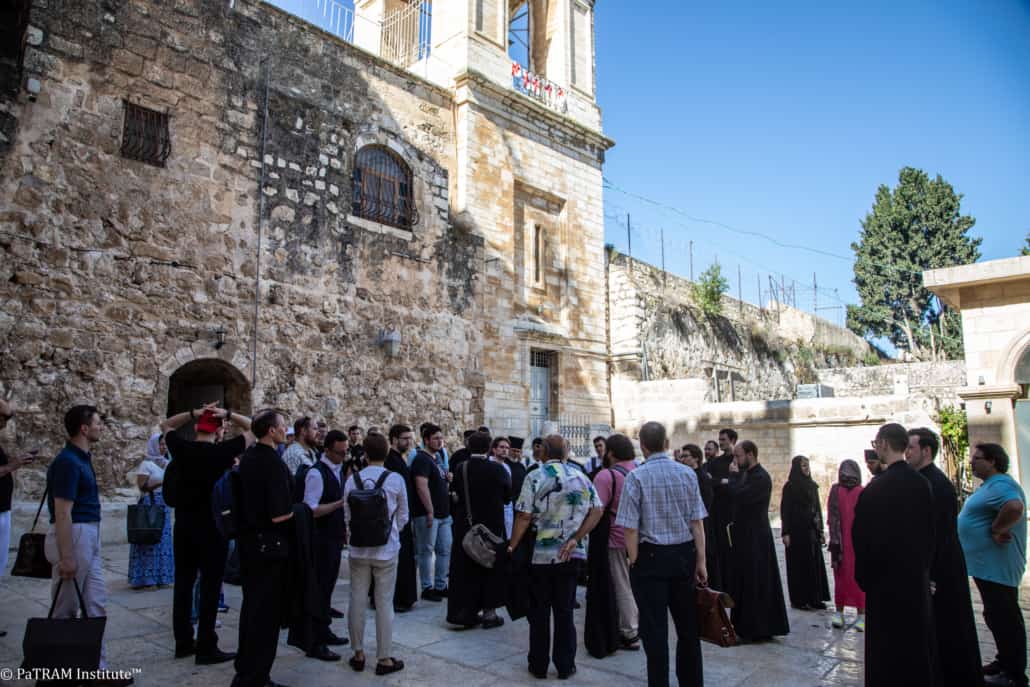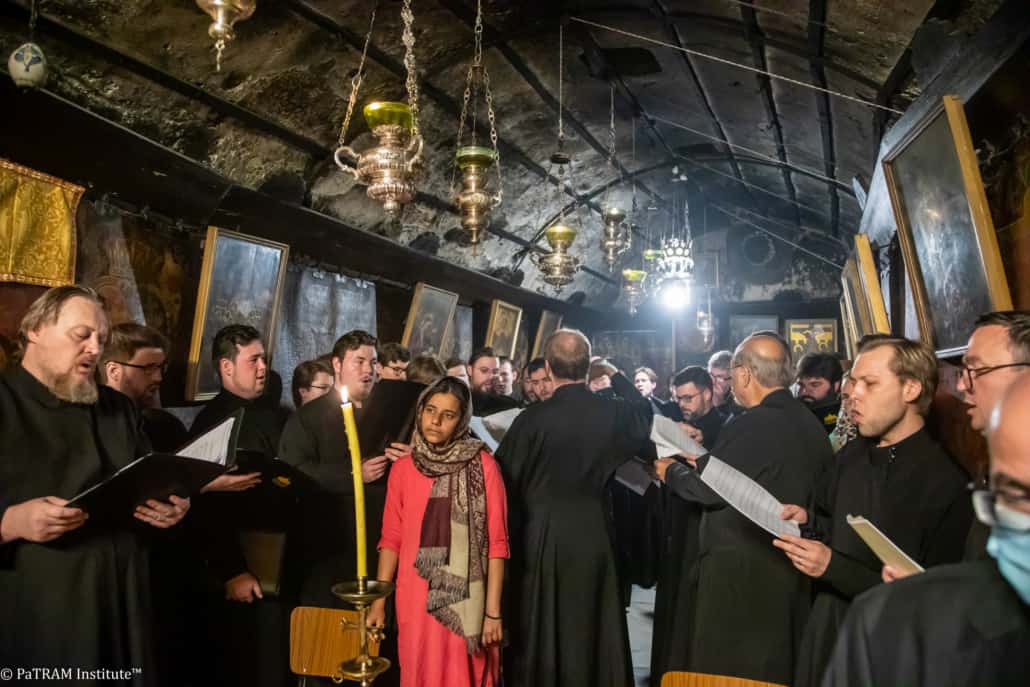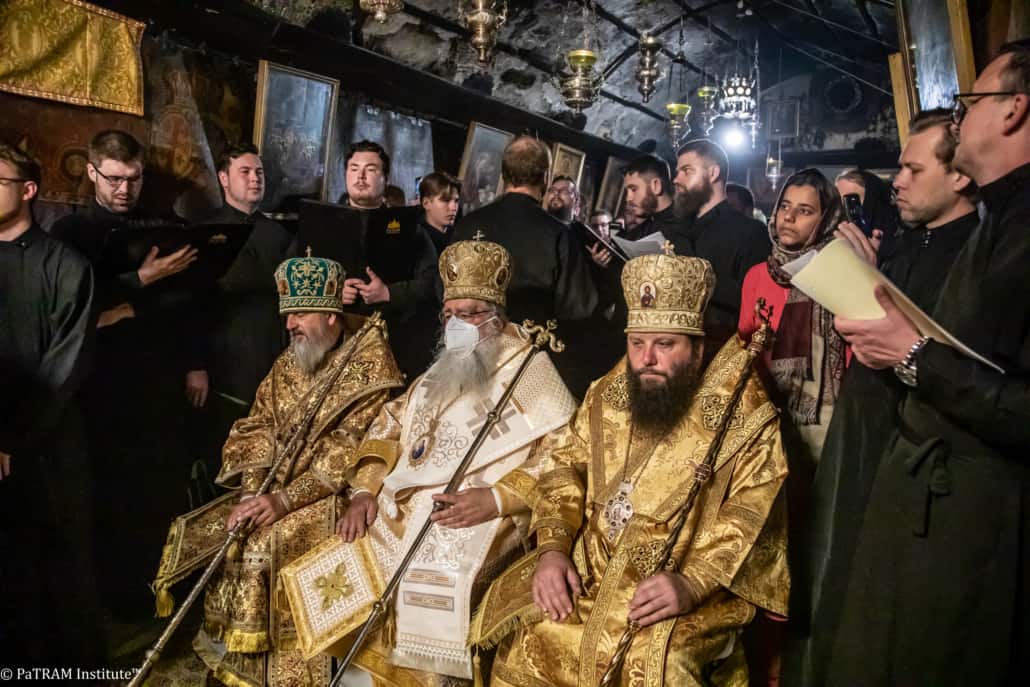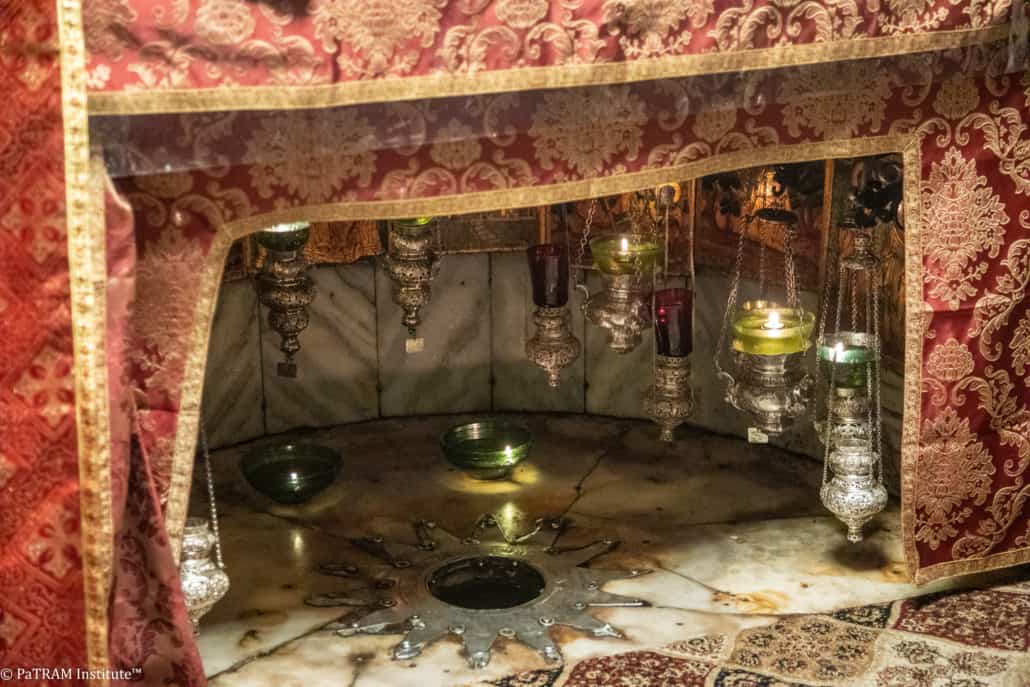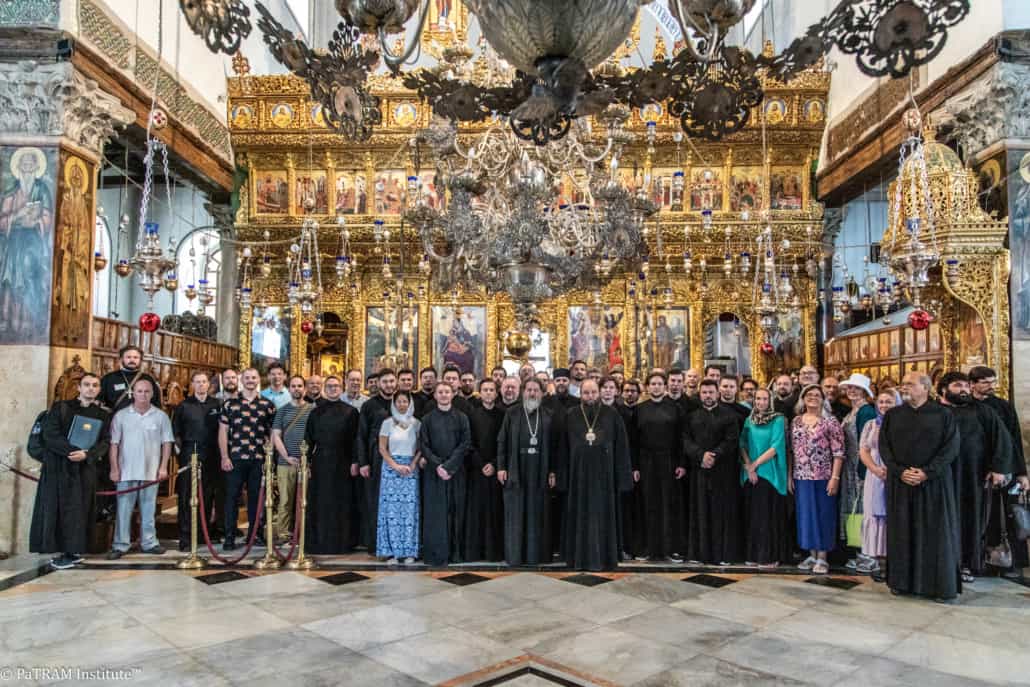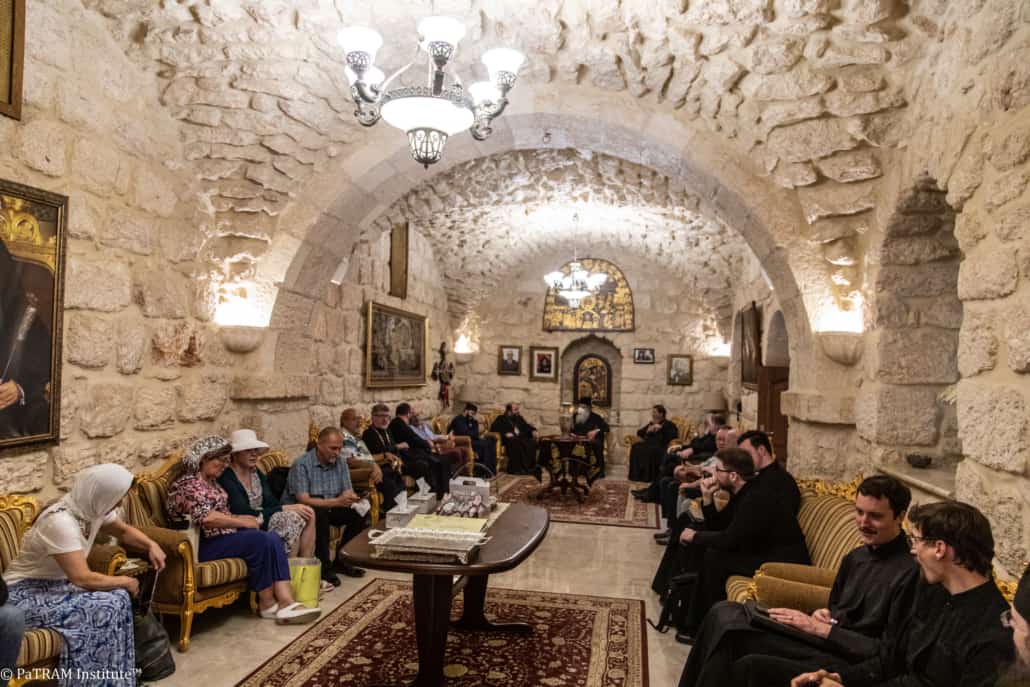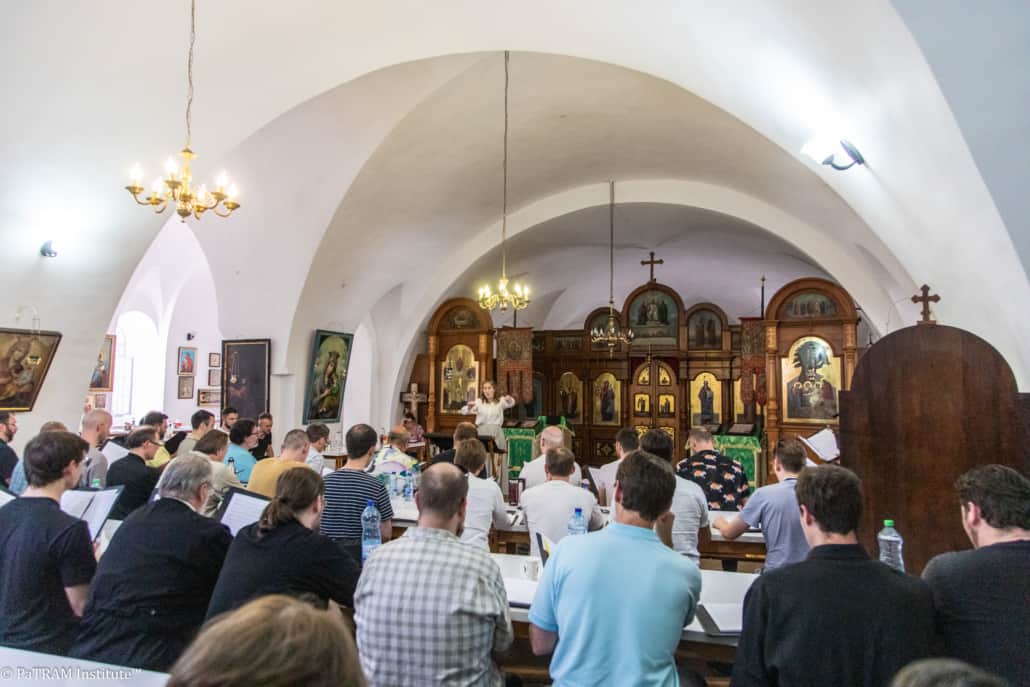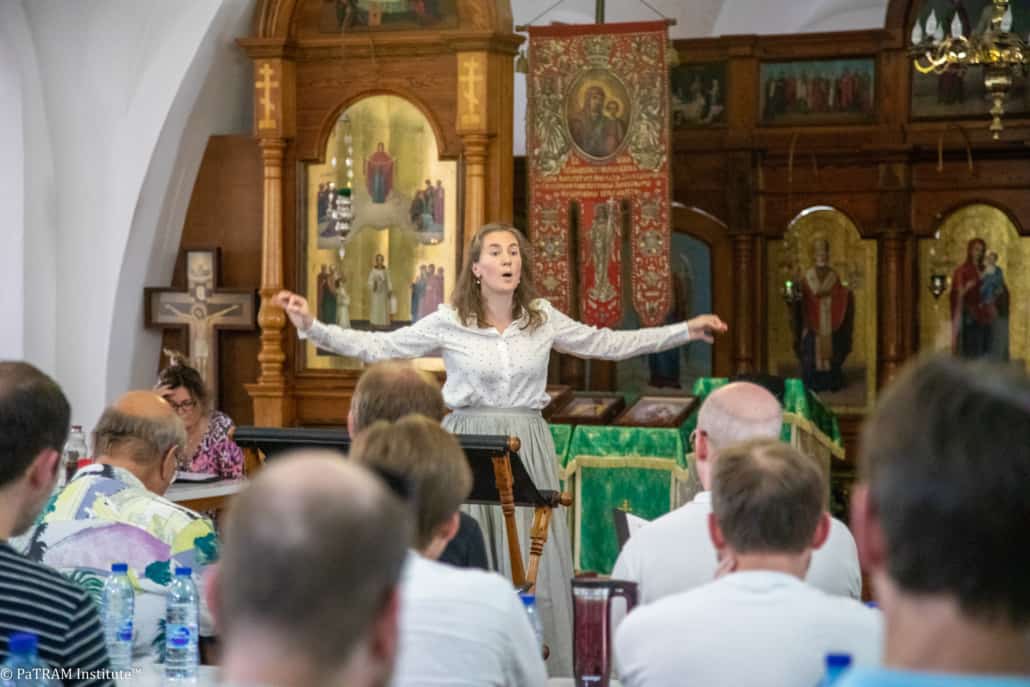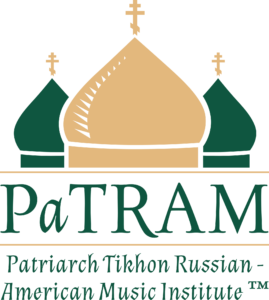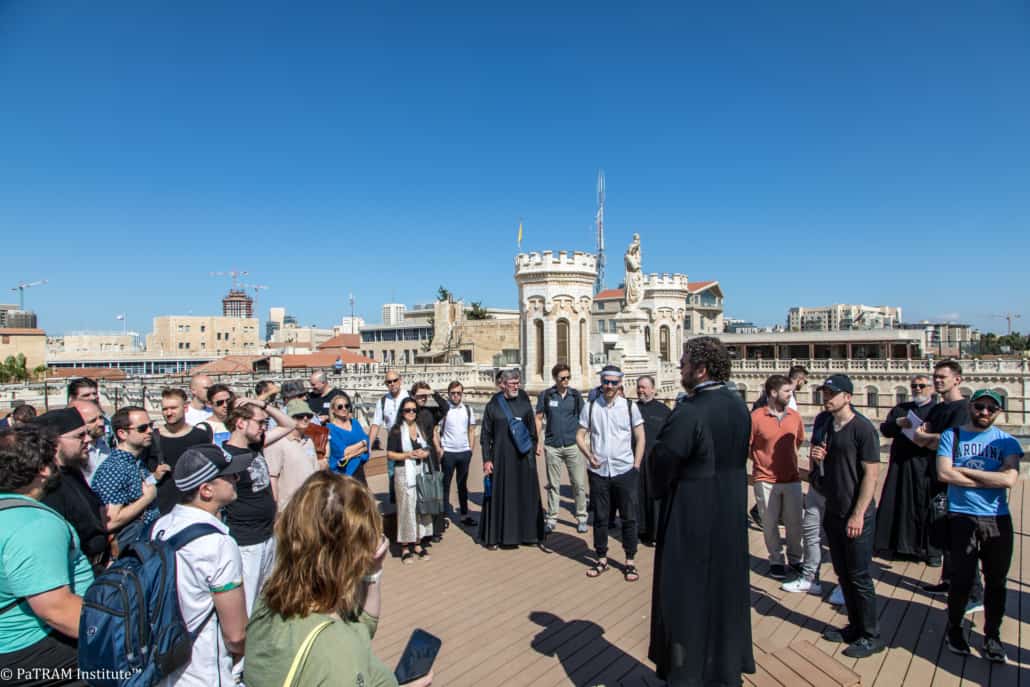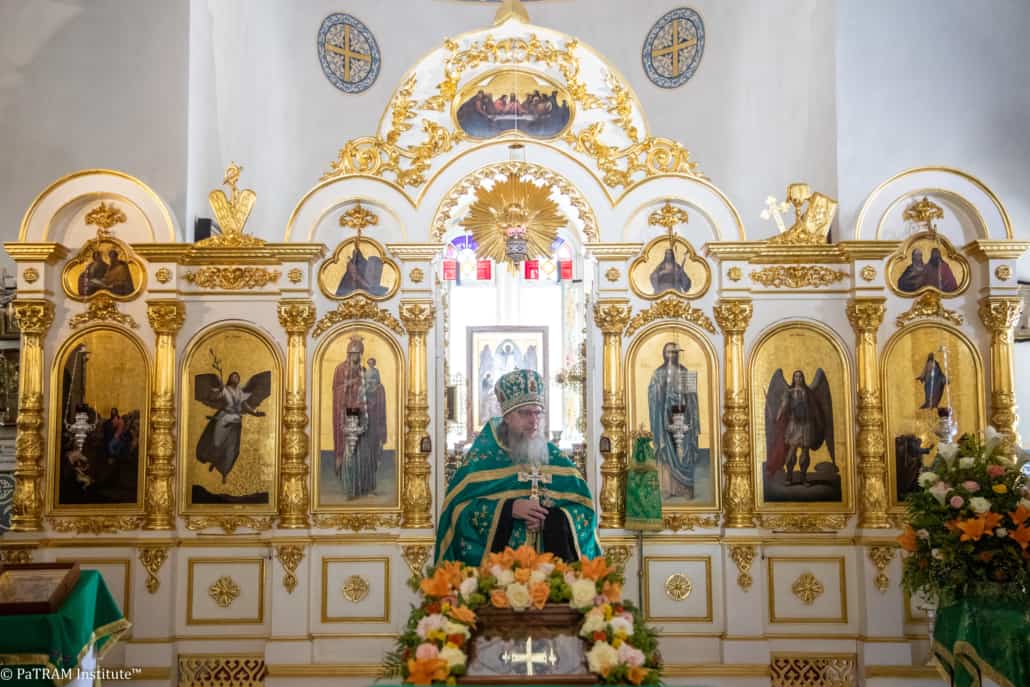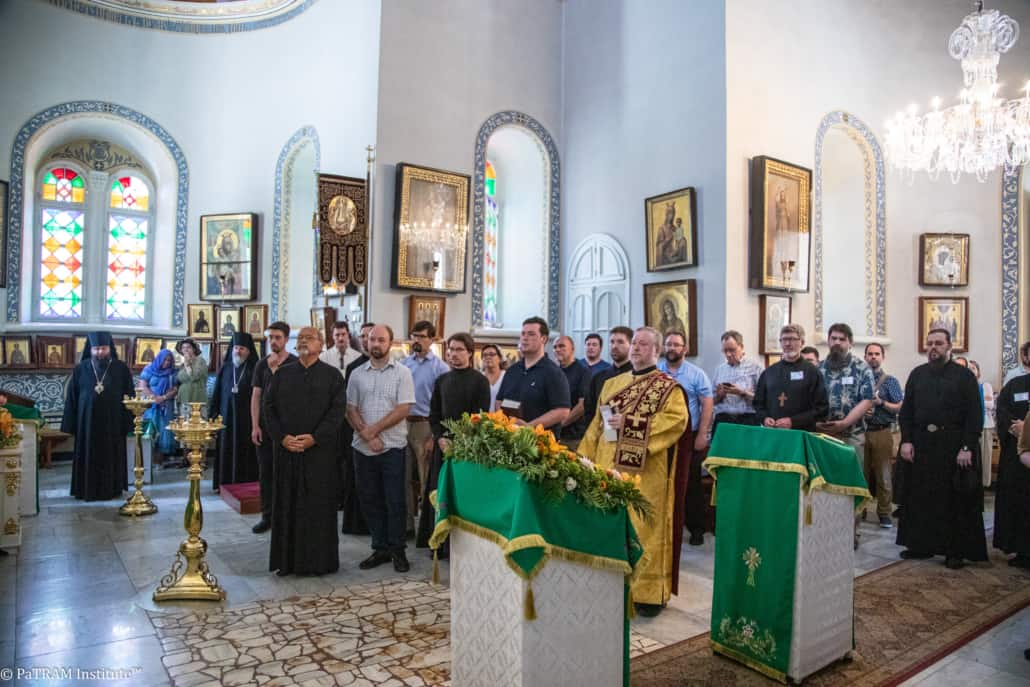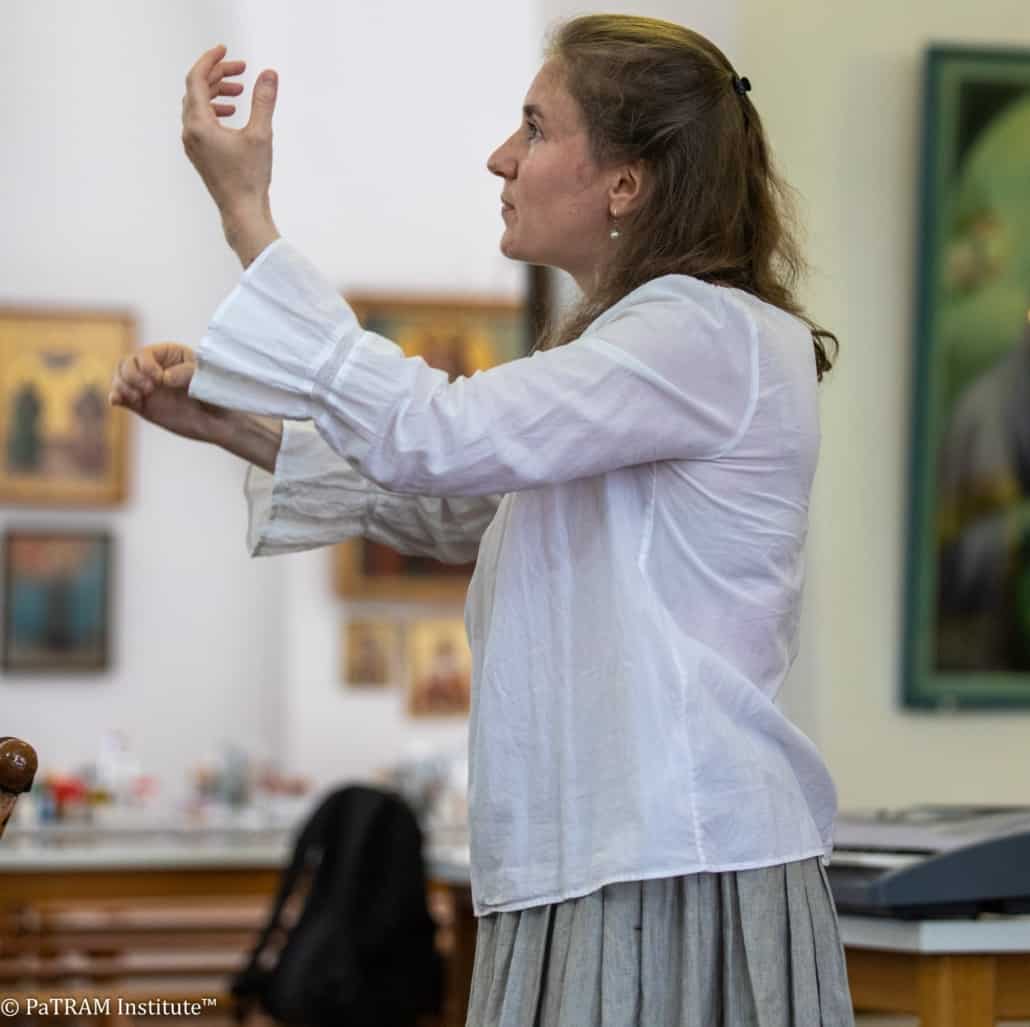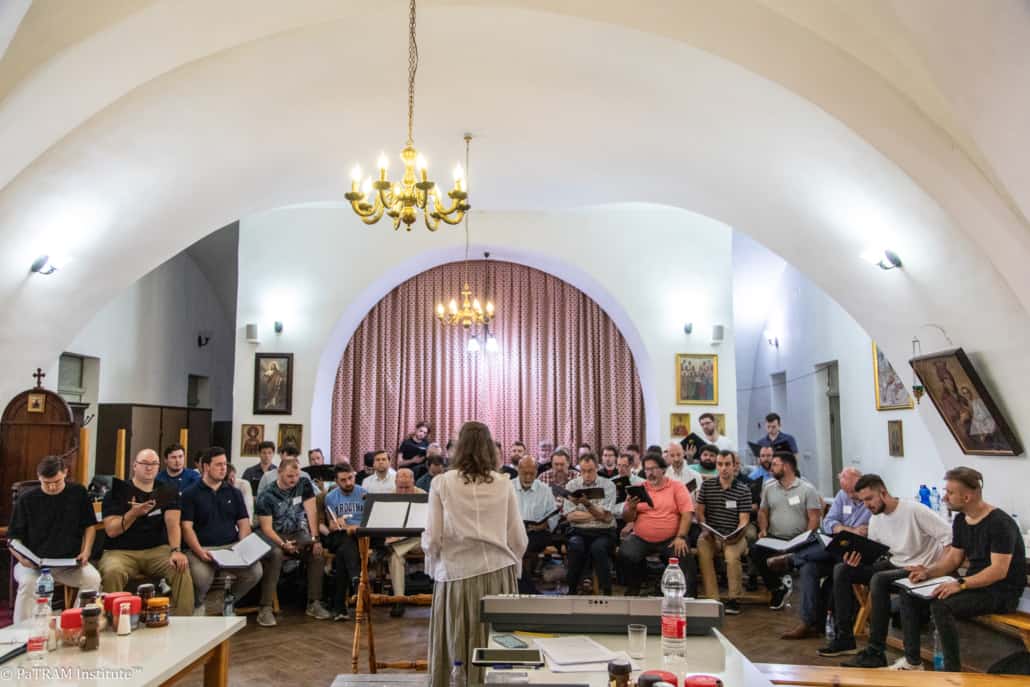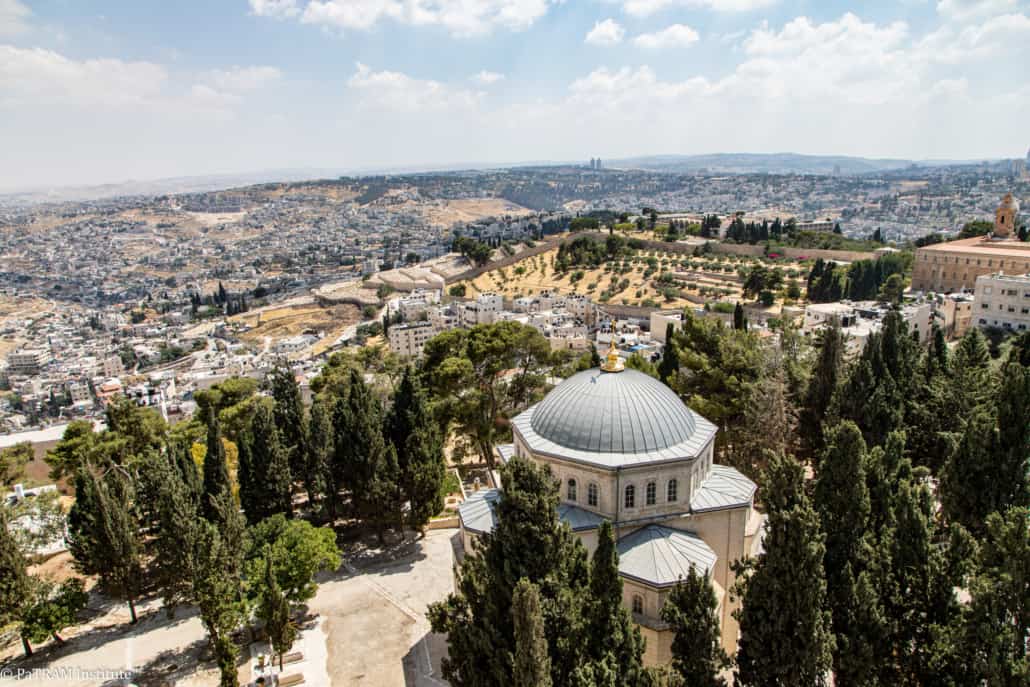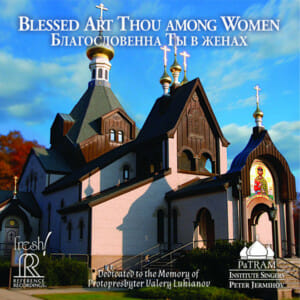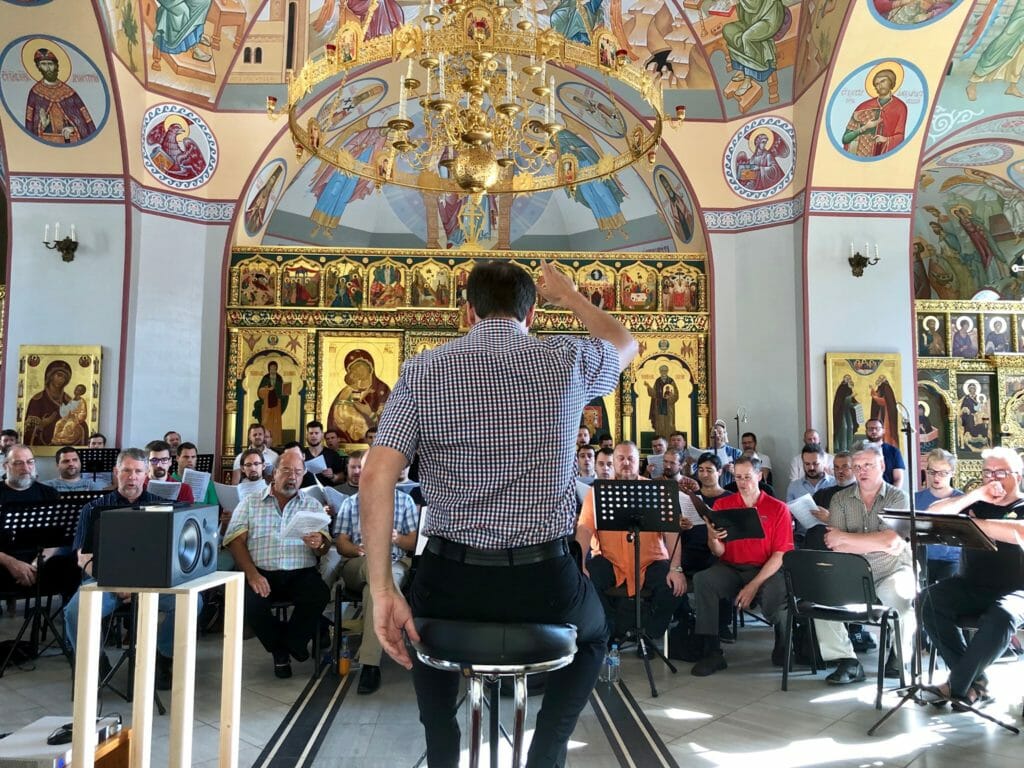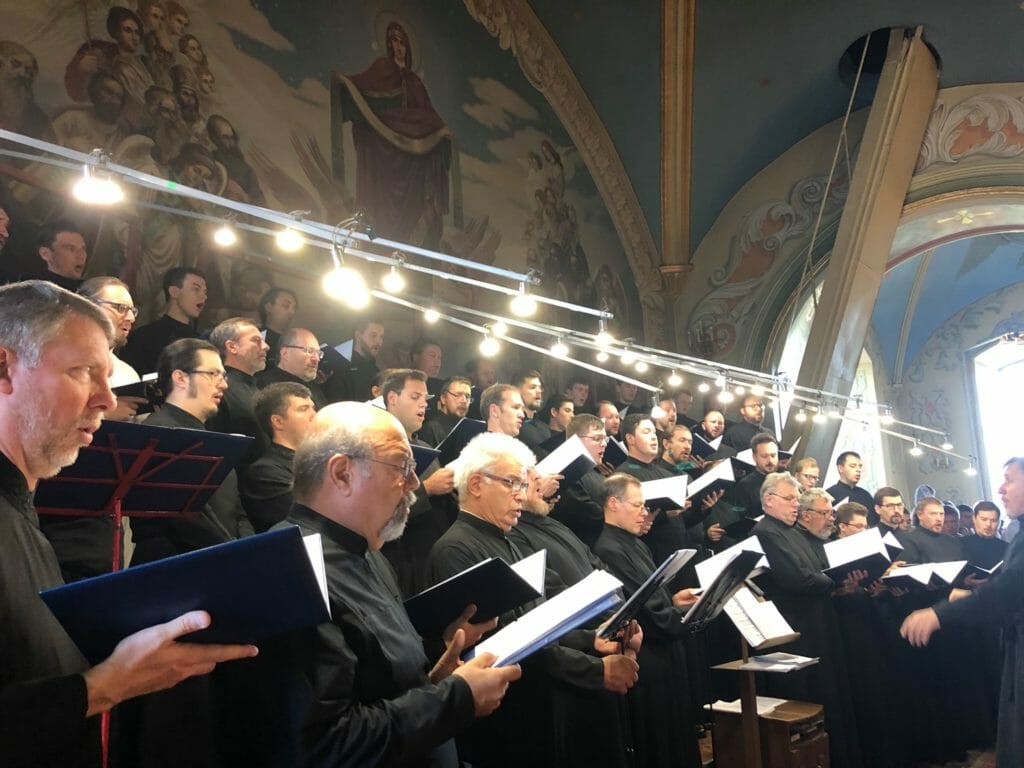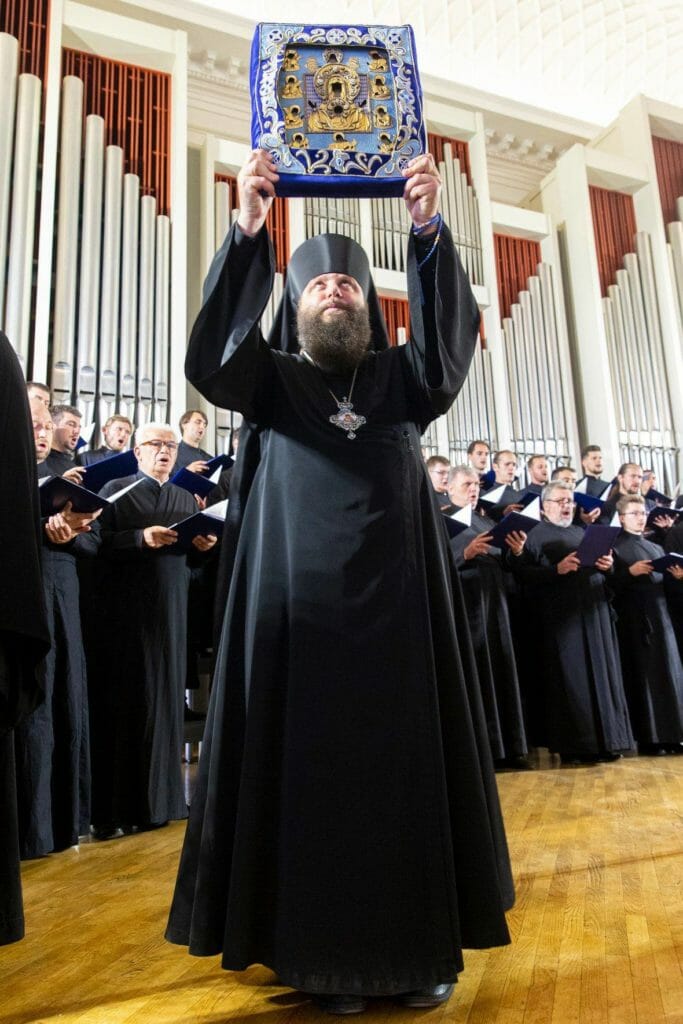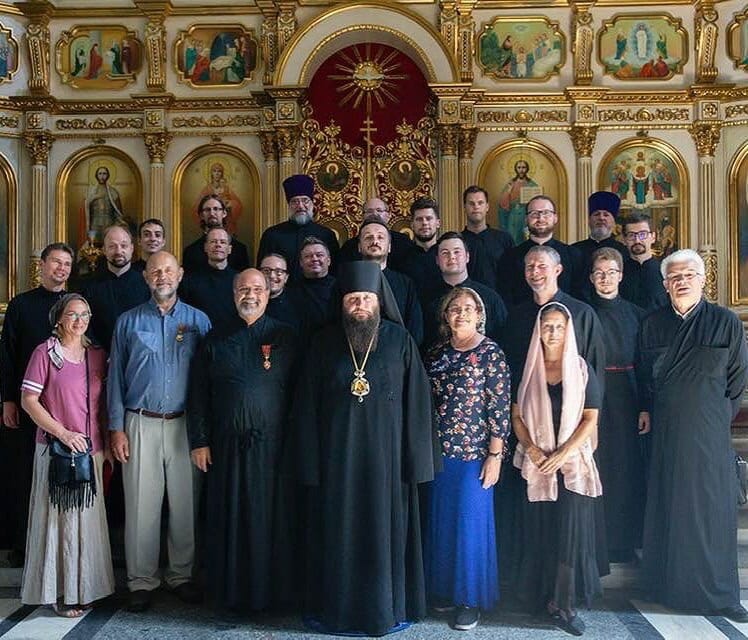Достойно есть блажити Тя, Богородицу (По русски)
Dmitry Anokhin
Translation by Gregory W. Levitsky
INTERNATIONAL MALE CHOIR RECORDS CD OF ORTHODOX HYMNS TO THE MOST IMMACULATE LADY
The visit of the Kursk Root Icon of the Mother of God “of the Sign” to Saratov, Russia, was accompanied by a unique musical project, which brought together singers from five countries. During the Dormition Fast, a combined male choir under the direction of Vladimir Gorbik, conductor at Holy Trinity Representation Church in Moscow, recorded a CD of hymns, entitled “More Honorable than the Cherubim,” in Saratov’s St. Nicholas Monastery. On August 22, the choir performed a large solo concert, which sold out the L.B. Sobinov Conservatory. A reporter from The Journal of the Moscow Patriarchy found out what comes next, how millionaires and doctors from the U.S. wound up in the combined choir, and what the overseas visitors did while in Saratov. PDF-version (Russian)
Day One – The Drummer’s Fate
It is the after-feast of the Transfiguration of the Lord at St. John the Theologian House Church at the Saratov Seminary. Outside, the warm August weather pours across the Volga region, while indoors, the atmosphere is heating up under the demanding gaze of conductor Vladimir Gorbik. To his right and a little ways back sits his chief assistant in this project: Katherine Lukianov, also a professional conductor, who over the course of her years serving in the U.S. has fostered three church choir groups, who now sing competently and independently. Recently, Katherine has been focused on the work of the Patriarch Tikhon Russian American Music (PaTRAM™) Institute. She worked as the non-profit’s executive director immediately after its creation, and now occupies herself with its development and repertoire. It is namely Katherine who is able to navigate the plentiful palette of choral concerts dedicated to the Theotokos, who arranged for such a large contingent of singers, and who selected the hymns for the future CD. Now, she works at providing simultaneous translations of the conductor’s directions into English. Otherwise, the work would all be for naught: joining thirty-six singers from Moscow, St. Petersburg, and Saratov on the banks of the Volga were a dozen from the U.S., three each from Serbia and Australia, and two Canadians.
Their group is not only highly selective: you could say it was run through the narrowest sieve of exacting requirements and conditions. One non-negotiable condition – not even to be included in the project, but to have one’s application considered – was individually covering one’s part over Skype. Everyone who passed this selection stage not only received all of the score pieces in the mail (this being the program of a large concert in two parts – around an hour and a half of singing), but also audio files with tracks to learn the voice parts. The pride and genuine treasure of such scrupulous preparation were the dozen bass-octavists, stunning with their soft velvet low notes, which captivated both the audience members in every conceivable and inconceivable spot in the hall of the Saratov Conservatory, and the small number of observers of their rehearsals. “Five of them have a working ‘fa,’ three – a contra-octave ‘re,’” acknowledges the author of these lines, Vladimir Gorbik. “What’s more, two of them only discovered this during recording!”
Such a wealth of performance talent, with the broadest spectrum of ranges (the demanding audience could be certain that the first tenors could confidently and effortlessly hit “re” on the second octave, to say nothing of rigorously maintaining their singing posture) afforded the opportunity for freedom in compiling the project’s repertoire. Of course, church composers (both of bygone eras as well as our contemporaries) write less for male choirs than for mixed. Like it or not, such a large-scale project could not be undertaken without a talented arrangement. Gorbik entrusted this work to his student in the choir of Holy Trinity Representation Church, Andrei Chervyakov. Eleven scores underwent his scrutiny. And in each case, this work was done one at a time, in the sense that the arrangements and rearrangements for each section of the choir were compiled for a specific collection of singers. Moreover, the musical texture of the scores for virtually the entire program was presented not in classical fours, but in five-voice part-based arrangements (for the parts of first and second tenors, baritones, first basses and second bass-octavists). This, in turn, gave the musicians the opportunity to seek and find “diamonds” scattered throughout the scores – for instance, the stunning voice leading of the second basses in the chorus of the Song of the Theotokos “My Soul doth Magnify the Lord” from Rachmaninoff’s “All-Night Vigil.”
Sitting in the first row is one of the trio of bassi profondi – Alexis Lukianov. Katherine Lukianov’s husband, an American millionaire, he has worked for over thirty-five years in management in the field of advanced medical technology. Alexis also “moonlights” as the general director and chairman of the board of directors of the Patriarch Tikhon Russian American Music Institute. “Observing the evolution of church singing in the parishes of North America, I came to the unfortunate and distressing conclusion that it is slowly but surely degrading. The sound of parish choirs grows faint and faded, which hardly lends itself either to bestowing a festal character on the divine services, or to the mission of Orthodoxy. Aside from this, we would like to see our singers singing prayerfully and far more spiritually,” explains Lukianov. “My dream was this: if my business were a success, then I would commit one-tenth of the profits to a systematic correction of the situation. Metropolitan Hilarion of Eastern America & New York, First Hierarch of the Russian Church Abroad, gave his blessing for this undertaking. My business flourished, and we started off with courses for choir directors and singers – we conducted about thirty of these across North America. We first considered recording a CD when it became clear that our choir members needed some example, an ideal, toward which they could strive in their daily service. Thus arose first the male choir, and then the mixed, now known as the PaTRAM Institute Singers. Now it has become clear: if we do not explain the importance of our work to the clergy, then we will continue just spinning our wheels. Thus, working for the future, we decided to organize master classes in church singing for the seminarians in Jordanville.”
It is worth adding to this that Alexis’ breadth is not limited to business and church singing. He began as an amateur musician, a drummer. Nine years ago, he produced Broadway shows, one of which – “Memphis” – even won a Tony Award (the theatrical equivalent of the “Oscars” for movies).
Day Two – Nomination for a GRAMMY
Lukianov finances the work of the PaTRAM Institute independently. But in Saratov in 2019, he was able to cover only nine-tenths of the expenses. With uniquely American determination and drive to succeed, in order to make up the difference, he invited aboard two companions – Greg and Brian. Among the American contingent of guests, they were the only two who were not directly involved in the musical aspect of the project.
During the program’s run at the Saratov Conservatory, Greg and Brian tactfully recorded the goings-on on their phones, photographed the rehearsals, and exchanged whispered impressions, which this trip gave them in abundance. Greg, a Catholic by faith, came to Saratov with his wife. The pair was enchanted by the expansive Volga landscape, the Russian hospitality, and the beautiful sound of the ideally selected male choir. Brian is areligious, and came to faraway Russia, where bears walk right down the streets, with his entire family. He recalled how his relatives even teared up as they were leaving. And you could not be sure if he were joking or being entirely serious.
Why did Greg and Brian answer Lukianov’s call? The latter certainly had a trump card: the previous album of PaTRAM’s international male choir, also recorded in Saratov, three years earlier. Featuring a collection of Pavel Chesnokov’s compositions and entitled “Teach Me Thy Statutes,” it caused a furor in the U.S.: the authoritative musical review site MusicWeb International officially recognized the CD as its 2018 Recording of the Year. And this year, it was nominated for a GRAMMY in the field of “Best Choral Performance.”
Yet another American not in the singing contingent is instead fully immersed in the arrangement of notes. This is Blanton Alspaugh — a sound engineer for one of the best American recording studios, Sound Mirror, in Boston. And while the CD recorded three years ago in Saratov was a hair’s breadth from winning the most prestigious American music award, Blanton himself did win, as producer of the “Teach Me Thy Statutes” CD. This is either his 10th or 11th award – he says even he doesn’t remember.
The concert itself, which took place on a stuffy Saratov evening, began with a seriously threatening attempt to take down the doors to the Conservatory’s concert hall. One of the best acoustically outfitted concert halls in provincial Russia (it is no coincidence that, just before the start of the First World War, this educational institution was opened personally by Emperor Nicholas II), it had not seen an audience like this in ages! The audience, who literally fought their way into the hall, was ready to stand in the aisles. Meanwhile, the Most Holy Theotokos reigned up on stage: Bishop Nicholas of Manhattan had brought the wonderworking Kursk Root Icon to Saratov, and triumphantly accompanied it to the hall for the beginning of the concert.
“We have done nine-tenths of the work,” Gorbik announced to reporters before the performance began, referring to the project’s main goal: recording a new album. But it is likely that even the most exacting audience member at the concert – which lasted for two hours with no intermission – would be hard-pressed to name any particular shortcoming that could qualify for that missing 10%. The exact precision of the framing and the impressive nuance stunned the audience, and held their rapt attention for the entire evening. There was not even the slightest foreign accent in their pronunciation! And the auditorium fell in love with the inimitable baritone of soloist Michael Davidov.
Day Three – Breaking Boundaries
Gorbik is terrifying in his wrath. The style of his work can be outwardly described as tender authoritarianism; he himself likes to speak of the carrot and the stick. There is no other way to handle such a large artistic group, gathered from various countries and comprised of musicians representing various vocal techniques.
“The concert does not just sap energy – certainly, it also adds fuel. Any musician knows this,” admits Maestro Gorbik, who has three conservatory degrees (in Composition and Symphonic and Choral Conducting). “Feeling that more could be accomplished with the group collectively, I saw this goal and began to demand of them total dedication. I am very grateful to all of the singers: they heard me and understood me correctly. We have one American singing in the choir, Victor, a neurologist by trade. We had crossed paths earlier in the overseas master classes. After completing the recording, I approached everyone who had been on the receiving end of my ire and asked them not to take offense. And Victor admitted that such a professional approach had, of course, been stressful for him, but extremely helpful.”
But what then of the “report” of only nine-tenths of the work being done?! “I meant what I said,” parries Vladimir Alexandrovich. “But as a result, the choir gave not 100%, but 180% for the recording.”
After the project’s completion, Vladimir Gorbik did not fly home, but to New York City, where he was awaited by the Capital Symphony Orchestra. This young group, founded by Gorbik, is only two years old, and is comprised of two sections – Russian and American. On October 30, it will be holding a concert [in America], under the symbolic header, “Breaking Boundaries.”
Alexis Lukianov also has not tired of breaking boundaries. For next year, he has already planned a new international project – a concert of choral compositions of spiritual music, in which the connecting role of the conductor and the reader will be performed simultaneously by national artist of Russia Evgeny Mironov, who has already agreed to the part. Alexis intends for all of the profits from the project to benefit one of the largest benevolent foundations in Russia, one which helps handicapped children. For the year after that, he wants to carry out the same program on some of the most prestigious stages in Russia, China, Great Britain, and the U.S.
Metropolitan Longin of Saratov & Volsk: “The tradition of receiving yesterday’s schoolchildren into seminary is becoming obsolete.”
The head of the Saratov Metropolitanate speaks about why he took the international Orthodox choral project under his wing, what he feels when he remembers the 1990s, and under what conditions it would be possible to resurrect the old diocesan cathedral on the current site of the “Dynamo” Stadium. PDF-version (Russian)
It took an entire year to prepare for the arrival of the Kursk Root Icon.
— Your Eminence, the performance of the international combined male choir under the direction of Vladimir Gorbik in Saratov was accompanied by the visitation to your diocese of the wonderworking Kursk Root Icon of the Mother of God “of the Sign.” The choir greeted this sacred icon in Saratov’s Holy Virgin Protection Church, and then sang at Divine Liturgy. How significant are these festive events for the entire Metropolitanate and for Saratov?
— The visitation of any holy object to our diocese is always very important, and stirs the faithful of Saratov. The thing is that the Lower and Central Volga regions are relatively young as Russian lands. Unlike ancient Russian cities, Saratov cannot boast of a centuries-old history of Orthodoxy, overflowing with examples of saintly God-pleasers. We do not have the same number of saints and holy icons and relics as, for example, another Volga city like Yaroslavl. Therefore, any encounter with a wonderworking icon visiting from afar is especially meaningful for the flock. All the more so, since we are speaking of one of the principal holy icons of the Russian Diaspora, whose history reaches back over seven centuries. As we know, the Kursk Root Icon takes part annually in the revived historic procession in the Kursk Metropolitanate to the Kursk Root Hermitage, and then visits one additional diocese in Russia. We prepared for over a year to greet the icon.
— The project under the direction of Maestro Gorbik has a backstory, and it was here, in Saratov, that three years ago the same group recorded its first double album of Orthodox hymnography. What is behind this mutual fondness between the choir and your diocese?
— Vladimir Alexandrovich is a person dear to me, even very close. He began his work as a choir director when he was still a student at the Moscow State Conservatory, at the Holy Trinity-St. Sergius Lavra Representation Church in Moscow, where I was rector at that time. And we formed a truly fruitful team. I was not just his boss – for a while, he also confessed to me. When he finished the conservatory with honors and received various job offers, he came to me for advice in choosing his career path. I told him that I saw him as a choir director. You see, for a professional musician, even one who is a sincere believer, obedience in the choir, with rare exception, remains off to the side, a secondary activity. What then could one expect of a young man who just recently came to the Church! Nevertheless, after giving it some thought, he agreed with me, and was not afraid to reject a secular musical career.
In 2003, I took up the See of Saratov, but we did not stop corresponding. And the choir at the Holy Trinity Metochion was highly appreciated by Orthodox Americans who went to Russia on pilgrimage. They especially liked the combination of utmost professionalism with a firm grounding in the tradition of Lavra singing, which Gorbik inherited from Archimandrite Matthew (Mormyl). At first, they invited Vladimir to the U.S. for the master classes. Later, a combined male choir was formed. With the support of wealthy Orthodox Americans who were not afraid to invest their own money in the project, the Patriarch Tikhon Russian American Music Institute was founded, which has as its goal the elevation of church singing in the U.S. parishes. It was this organization that proposed the idea of recording CDs with choral compositions selected from the treasury of Russian church music, which themselves could become missionary Orthodox projects in the West. Three years ago, the first album with works by Pavel Chesnokov was successfully recorded in Saratov. This time, hymns were chosen in honor of the Mother of God. In addition to the recording and the divine services, there was also a concert in the Saratov State Conservatory, at which the Kursk Root Icon was present.
— Vladyka, you served as rector of Holy Trinity Representation Church in Moscow for almost eleven years. That time was a difficult one for the country and for Russian society. What do you remember from that period most of all?
— Human memory is selective, and generally retains mostly good memories. But these were truly difficult times. At the very moment when I was appointed rector, the so-called Abkhaz-Georgian conflict erupted in my adopted homeland of Sukhumi. My mother was evacuated to Sochi on a military transport under fire from the beach. The Representation Church in Moscow did not exist at that time as we understand it today: its territory was a large landfill. We gradually succeeded in returning the remaining buildings and part of the former grounds to the Church.
The nineties are often characterized as a time of collapse. This is accurate. But at the same time, this decade was a period of unheard-of ascent for the Church. Our generation was lucky to have begun our service and grown in it during these years. A multitude of good, open, sincere people came to the Church – enthusiasts in the highest sense of the word. They returned to the Church as if they were returning home, which was unbelievably inspiring. That was a time of sacrifice of the kind we rarely see today.
A night-time education at the theological schools
— You have led the See of Saratov of sixteen years. How would you characterize the general trends of your service here?
— In day-to-day affairs, I try to develop Church life in all of its spheres: building churches, engaging in Orthodox education and formation. Several monasteries have been restored, several have been built from scratch and opened. If I had to highlight one of the completed undertakings, it would be the seminary I head. Of course, we have more left to do. For instance, Holy Transfiguration Monastery, which before the revolution was one of the most renowned in the Central Volga region, is still awaiting real restoration work. But the most important thing in Church life is the people: the pastors and the flock. Therefore, my first concern is for them.
— Five years ago, the Saratov Seminary obtained both a well-adorned building on Michurin Street, and the beautiful St. John the Theologian House Church. In one of the latest Church-wide rankings, this educational institution soared to the uppermost rungs. What is the secret of these impressive results?
— It is my deep conviction that the main administrative task of the ruling bishop is to select faithful personnel and place them appropriately. Every key position must be occupied by someone who is capable of accomplishing the tasks set before him with maximum success. I do not recommend governing according to any other criteria, and I try not to even pay such criteria any mind. Of course, as ruling bishop, I cannot constantly delve into the everyday affairs of the seminary, and thus especially important are the qualifications of my assistants – provosts, inspectors, and course professors.
— How was your 2019 recruitment campaign? Are you satisfied with the quality of students you admitted? And what did the application “contest” require?
— We have not had a contest as such for a relatively long time. We accept virtually all who are willing, except, of course, outright “D students.” There are relatively many seminaries open now, so for the most part we teach local Saratov students. In itself, this is not bad; after all, before the revolution, the seminaries trained their own local personnel for service in their dioceses. But new students vary strikingly not only from applicants twenty years ago, but even ten years ago. This is connected to the fact that young people have practically stopped reading. If, at the beginning of the 2010s, I would ask an applicant what book he had recently read, now I have to ask what movies he has recently watched, what games he has played, what music he prefers. And we are not talking about boys coming in from the street – these are good, well-mannered, more or less churched young men!
I think that the practice of receiving high school graduates into seminary is becoming obsolete. Today’s seventeen to eighteen-year-olds still possess an unacceptable degree of infantilism. It is not so much that they lack motivation in life, but that they do not even think about it, with absolutely no appreciation for what it even is! Many of them are not prepared internally for the prospect of being ordained. Of course, five years of education in seminary does not leave you without some trace. Those who survive our education regimen are changed by the theological school. But a significant number drops out – in some years, this has been up to half of the students. I have absolutely no interest in quantities or statistical percentages! I consider it better to bid a timely farewell to someone who does not belong at the theological school, than to drag him to his diploma by means of whatever truths or fictions are needed, and then you don’t know if you should ordain him or what. If this current and unpleasant trend continues, we will have to seriously consider altering the principles of our work with student-seminarians.
However, in my view, the time has come to create the conditions for well-composed, family men to receive a quality seminary education. We understand that they cannot drop their families and jobs and come live with us in the dormitory. Of great value here is our correspondence department, which we have seen evolve over the past years. Traditionally, it was mainly clergy who studied this way. But now it is not so: there are not many such cases, but the number of ordinations among the correspondence students happens at no less a rate than among the general student population.
In my day, I happened to receive my university education by taking night classes. Clearly such a format could be useful in theological schools, as well, especially for seminaries located in big regional centers. If such a thing were to happen, students could receive a quality theological education, and the staff and administration would have a chance to see them as they developed, and not once or twice a year, as with the correspondence students. After all, the rector-bishop must know the candidates for ordination not merely by reputation or paperwork, but individually!
— Saratov State University is one of the best in the Volga region. Are there any opportunities for collaboration?
— Of course. From the very beginning, we had very honest, genial relationships with the former rector (now president) of the university, Leonid Kossovich, and with his successor, Alexey Chumachenko. Our professors teach courses in the Philosophy, Theology, and Religious Studies Departments, and the university professors help in our education process. We hold a large number of joint events. For instance, the Pimen Readings, dedicated to the memory of our department head in the Soviet era, Archbishop Pimen (Khmelevsky). The university students are very active on social media and recently started a Facebook group named “Orthodox Saratov.” The university church dedicated to the Holy Equals-of-the-Apostles Cyril & Methodius is a de facto parish, with parishioners worshipping there on Sundays and feast days. The community there is very strong and friendly, a lecture hall is available for the students, and meetings with interesting people are organized on weekdays.
“Program 20” – Preliminary Results
— Holy Trinity Diocesan Cathedral, built in 1674, is not far from the banks of the Volga River, and is one of the landmarks of Saratov. It is considered the oldest building in the city, and is the first entry in the regional codex of cultural heritage sites, identified as a monument of federal significance. Does it accommodate all who wish to worship there, or is it, as the saying goes, “bursting at the seams”?
— No, it is not bursting at the seams; there is room inside for all who wish to pray there. On especially significant days, which are attended by guests from various cities and regions, we perform the festal divine services in the more capacious Holy Protection Church. But generally, the situation with the operational churches has righted itself: no longer are there instances where people are crushed or forced to pray on the street. When I came to this diocese, the new Saratov suburbs did not have a single church! Over the past two years, we have gotten nineteen up and running, with construction being completed on a twentieth. Our average capacity is 11,500 for each of our sixty-four parishes. This is an acceptable amount.
— What about the “new” Diocesan Cathedral of the Holy Right-Believing Alexander Nevsky, which our forebears built in memory of the victory over Napoleon? Is rebuilding it really unrealistic?
— Why, it’s entirely realistic! But the matter is complicated now, in that the “Dynamo” Stadium currently occupies that spot. And the situation with sports venues in Saratov is very lamentable, and we cannot eliminate one of the most accessible stadiums for our citizens. That is why a necessary precondition of restoring the historic St. Alexander Nevsky Diocesan Cathedral is the relocation of the “Dynamo” Stadium to another location in the city center. I hope that with time this plan will be realized, and we will see a restored “new” diocesan cathedral. This would be just and proper, as the remains of two of Saratov’s hierarchs – Bishops Abraamius (Letnitsky) and Euthymius (Belikov) – are buried below the racetrack at “Dynamo” Stadium.
— You have announced that one of the diocese’s tasks is to restore dilapidated and neglected prerevolutionary churches. Are you referring to architectural monuments in particular, or not only these?
— Virtually all such buildings have protected status, and for those that do not, we are currently launching the requisite registration process. So far, we are only approaching this task. There are about sixty such buildings in the Saratov Oblast, in our diocese – about forty. Some of them are able to host the divine services. In some places, nothing is left around the church – the villages died out. There are several examples of dying churches being restored either by the parishes themselves or by benefactors. Right now, we are trying to give a more coordinated character to this process. Let us say there is a large dilapidated cathedral in the village of Kutyino. Next door, they have opened a small, simple church, which entirely suffices for the performing of divine services for the small parish community. But the church was very beautiful, and on a diocesan level, of course, we ought to think about how to prevent its total loss.
— Eight years ago, answering a local reporter’s question about relations with the regional government, you answered, not without some subtle humor: “The only unfortunate thing is that issues relating to some problems or other in church life are resolved very slowly. The coefficient of useful action is often close to zero, but despite this, our relations remain good.” What about now?
— Thankfully, these problems stayed in the past. The key issues in our region are tackled with the help of the speaker of the State Duma of the Russian Federation, Vyacheslav Volodin, for which all citizens of Saratov are grateful to him. I think that, in this sense, the Orthodox faithful are no exception.
Project Participants Sound Off
Deacon Nicholas Kotar, choir director at Holy Trinity Monastery in Jordanville (New York, U.S.):
— I do not have a musical education: I taught myself; I’ve been in the choir since childhood. The repertoire here was, of course, magnificent. Our singers, who are primarily used to the sound of non-professional choirs, could not have performed this music without preparation. The rearrangements were also complex: the tenors had very high notes.
Nektary Kotlaroff, student (Australia)
— In Sydney and Melbourne, I direct the Russian Orthodox Choir of Australia. We only have amateurs singing with us, and so this repertoire seemed a little complex for us. We know these composers by name, of course, but far from all of the compositions were familiar to us before we began this project.
© The Journal of the Moscow Patriarchy and Church Herald, 2007-2011
